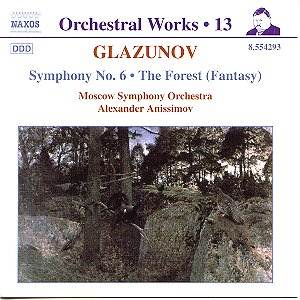ALEXANDER GLAZUNOV (1865-1936)
Symphony No.6 in C minor,Op. 58. The Forest, Op. 19.
 Moscow Symphony
Orchestra/Alexander Anissimov.
Moscow Symphony
Orchestra/Alexander Anissimov.
 Naxos 8.554293 [DDD]
[59'10].
Naxos 8.554293 [DDD]
[59'10].

It is good to see another Glazunov Sixth in the catalogue, this one being
particularly welcome because of its appealing coupling (and, of course, its
price). The competition listed in the current catalogue comprises Rozhdestvensky,
Butt and Jarvi, but I could not resist playing the 1948 Golovanov/Moscow
Symphony Orchestra for comparison purposes, if only to re-experience some
authentically Russian gritty, fervent playing (Arlecchino ARL A60, currently
absent from the lists - temporarily, one hopes).
The symphony was completed in 1896, receiving its first performance in February
of the following year. Glazunov's appealing harmonic and orchestrational
palette create an individual sound-world - there are many felicitous touches
of colour throughout. The Moscow Symphony Orchestra play with obvious commitment,
which overrides an occasional scrappiness in the upper strings. Wlist Anissimov
takes the slow introduction to the first movement too quickly to realise
the full import oif the ideas presented (more Andante than the indicated
Adagio), his symphonic argument is both cogent and dramatic in the movement
proper.
The middle two movements are a delight, and I felt continuously astonished
at the fertility of Glazunov's imagination. The second is a theme and variations,
in which the woodwind have a chance to shine. In particular, listen to the
oboe solo in the second variation, or to the wind 'comments' at 8'10. The
brief Intermezzo third movement evinces much charm (although the conclusion
could have been allowed more humour), but it is the finale that is most
successful. I would have liked the introductory Andante maestoso to be more
brooding and foreboding, but once the tempo picks up so does the mood. There
is a tangible dance-like feel present in the rest of the movement, the phrasing
affectingly lilting. This is not to deny the element of drama - witness the
timpani roll introducing the fugato passage near the end of the symphony.
The orchestral fantasy, 'The Forest', Op. 19 (completed in 1887) is an
imaginative fill-up. Disliked and dismissed by both Rimsky-Korsakov and
Balakirev, it would seem to have had the odds stacked against it from the
word go, and whilst it is true that it perhaps outstays its welcome just
a little, there is much to admire in its 21-minute duration. There is a most
appealing Eastern tang to the introduction (remember the Oriental Rhapsody,
Op. 29 dates from only two years later), and a supernatural feeling imbues
much of the piece. The scoring is deft and masterly - even the naive bird
imitation by piccolo and solo violin is touchingly sweet, and I can't share
Balakirev's qualms about the clarinet theme which depicts the nymph episode.
Listen out for the similarity of the trombone theme at around the ten minute
mark to the first theme of Liszt's 'Faust Symphony', S108 (interestingly,
completed in the same year).
The recording is in the main satisfactory, except for a tendency to crowd
at climaxes in the Symphony. In addition, I would have welcomed a little
more depth overall. However, this issue is wholeheartedly recommended for
anyone that wishes to investigate this fascinating repertoire at minimum
outlay.
Reviewer
Colin Clarke
Performance

Recording

and Ian Lace adds
Naxos's excellent Glazunov Orchestral Works reaches its 13th volume
with this new release. As with Glazunov's other eight symphonies the entries
in the record catalogues are rather sparse and once again, this seems to
be the only budget priced version available. The sleeve blurb claims that
the Sixth Symphony is one of Glazunov's most frequently performed works.
It certainly is very approachable and it brims with melodies, not the sort
that spin around in your head for days, I might add, but tunes that are
nonetheless most appealing.
Glazunov's Sixth Symphony dates from 1896 at a time when the composer shared
conducting duties, with Rimsky-Korsakov, of the Russian Symphony Concerts.
First performed in the following year, it was acclaimed by Rimsky-Korsakov
as the highest point at that time in the composer's development and a sign
of a new era in Russian music.
I have been fortunate enough to review Anissimov's readings of many of the
other Glazunov symphonies in this series, for other publications. They compare
reasonably well with the acclaimed Järvi recordings on Orfeo and the
unfolding excellent Chandos series with Polyansky and the Russian State Symphony
Orchestra (delivered in much better sound). Once again, for the Sixth Symphony,
Anissimov delivers a reading that mixes considerable excitement with finely
judged sensitivity. His opening movement has epic heroic grandeur with music
that crackles with energy; but he also paints, where appropriate, in more
sombre colours and he imbues Glazunov's lovely romantic melody with a radiant
purity. The second movement is probably the most attractive and interesting
of the work: a set of variations with another beautiful wistful string tune
as the theme, which passes through variations that initially give the music
a rustic quality -- first serene then joyful. A Fugato variation presents
the strings in darker hue before the music progresses to a nocturne that
uncannily anticipates Delius. A merry country dance variation leads into
a final, rather pompous march with brass prominent. The brief
Intermezzo-Allegretto is Glazunov in typical feather-weight ballet mode while
the finale is very much like the opening movement in its various moods.
Rimsky-Korsakov was rather scathing in his opinion of Glazunov's earlier
work, The Forest, composed in1882. Moreover, Balakirev found
the nymph episode unsatisfactory and the hunt music unreal. Although somewhat
inflated, at 21 minutes duration, The Forest nevertheless has its
moments and Anissimov makes a strong enough case for it. The episodic music
has fairly sparkling music for the nymphs and there is dark brooding mysterious
material suggesting unimaginable horrors deep in the impenetrable forest
and, of course, there is gentler material that might suggest lovers' trysts
under the boughs in sunnier bowers. On the whole a confident recommendation.
Reviewer
Ian Lace

